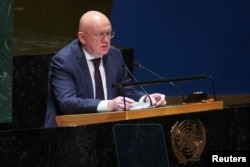Ukraine’s foreign minister sought to rally international support Friday at the United Nations, two years after Russia launched a full-scale invasion and war with his country and as the world is distracted by other crises and conflicts and U.S. military aid is held up in Congress.
“Moscow’s aim is to destroy Ukraine, and they are quite outspoken about it,” Dmytro Kuleba told a meeting of the U.N. General Assembly to mark the somber anniversary that drew ministers from many nations.
But he was eager to let the world know Ukraine wants peace.
“No nation in the world wants peace more than Ukraine; our country suffers the most,” he said. “But we also know that peace must be just, be just and durable. Simply putting the war on hold and hoping that the aggressor will be merciful enough to eventually choose peace is not a realistic plan.”
He said Ukraine wants to use President Volodymyr Zelenskyy’s 10-point peace formula as a roadmap out of the conflict and to discuss it with the international community at a peace summit they are planning to hold in Switzerland.
The plan, put forward in December 2022, calls for among other things, the withdrawal of Russian troops and an end to the fighting, nuclear security, the release of all prisoners and the restoration of Ukraine’s territorial integrity.
Later he told reporters that two years ago, many experts and diplomats did not think Ukraine would survive Russia’s full-scale invasion and today those same people do not believe Ukraine can win the war.
“Ukraine survived the invasion, and Ukraine will win the war,” he said. “If we act collectively and jointly, this will happen sooner rather than later.”
Russia’s U.N. envoy repeated Kremlin claims that it was not responsible for the war and that it was simply protecting Russian-speaking populations who were discriminated against by Kyiv.
“Russia did not start this war; it came to put an end to it,” Vassily Nebenzia said. “All the Kyiv authorities had to do was respect people’s rights, let them live in peace on their own territory, study in their own language, enjoy freedom of religion and freedom of thought.”
He said the goals of Russia’s “special military operation” — what the Kremlin calls its invasion — would be met, and they were not against doing this through negotiations. But he dismissed Zelenskyy’s peace formula as an “ultimatum to Russia” and said countries should not waste their time with it.
“Unbreakable spirit”
European countries and the United States expressed their continuing solidarity with Ukraine.
U.S. Ambassador Linda Thomas-Greenfield praised the “unbreakable spirit” of the Ukrainian people and said it should be an example for all people.
“Ordinary, extraordinary people, vastly outnumbered, fiercely defending their communities,” she said. “Teachers transforming bunkers into classrooms. City workers finding ways to restore heat and electricity after bombardments. Families rationing food to feed their neighbors.”
She said the world must speak in a unified voice to demand Russia end the war.
“That means calling for Russia to withdraw its forces from Ukraine’s internationally recognized borders and uphold the basic principles of sovereignty and territorial integrity,” Thomas-Greenfield said.
British Foreign Secretary David Cameron warned that Russian President Vladimir Putin has shown his appetite for taking the territory of others — South Ossetia in 2008 and Crimea in 2014 — and unstopped, he came back for more in 2022.
“Now, having tried and failed to conquer all of Ukraine, the lesson of this history is clear, if we do not stand up to Putin, he will be back for more,” Cameron said.
He said he understands some in the international community are tired of the conflict and a compromise might be appealing.
“But this is wrong,” Cameron said. “We must recognize the cost of giving up.”
Luxembourg’s foreign minister echoed that sentiment, telling reporters that if Ukraine is abandoned, it would not be the end of Russia’s aggression.
“Believe me, we don’t know who will be next,” Xavier Bettel said.
He cautioned that Ukraine is in a weaker position now than earlier in the conflict, and that Russia would not negotiate as long as it is in a stronger position.
“So, the support for Ukraine is also support for negotiations,” he said.
Around 60 countries were expected to speak Friday at the session.
The U.N. Security Council is also meeting Friday. U.N. Secretary-General Antonio Guterres said that in the two years since Russia’s full-scale invasion of Ukraine, that there has been too much suffering and strains on global relations.
“Enough,” he said.
“It is high time for peace — a just peace, based on the United Nations Charter, international law and General Assembly resolutions.”

